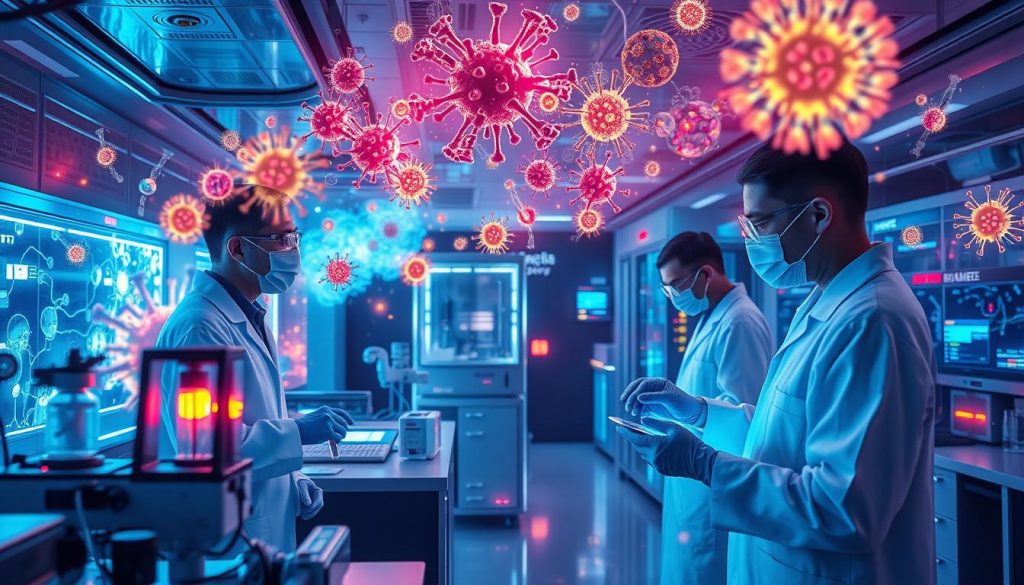The start of CAR T-cell therapy brings new hope to cancer treatment. It uses the body’s cells to fight cancer. This method is changing how we treat cancer, making treatments more precise and personal.
Key Takeaways:
- Reflects the modern advancements in CAR T-cell therapy as an innovative cancer treatment.
- Highlights the significant role of targeted cancer treatment in effecting precision medicine.
- Celebrates personalized cancer therapy as a watershed moment in cancer care.
- Embraces the promise of genetically engineered immune cells for tailored patient care.
- Stresses the importance of ongoing research in optimizing CAR T-cell therapy applications.
Understanding CAR T-Cell Therapy
In the field of cancer immunotherapy, chimeric antigen receptor t cell therapy is a big step forward. It changes how we treat cancer. This therapy uses the body’s immune system to fight cancer better.
Adoptive cell transfer is key in CAR T-cell therapy. It means treatments are made just for you, based on your cancer’s genes.
The Science Behind Chimeric Antigen Receptor Technology
At the heart of chimeric antigen receptor t cell therapy is changing a patient’s T-cells. These T-cells are given special receptors to find and kill cancer cells. After being put back in the body, they grow and attack the cancer.
The Evolution of Cancer Immunotherapy
The story of cancer immunotherapy has seen many steps forward. It started with basic immune tricks and now we have CAR T-cell therapy. This journey has been about finding better, less harsh treatments.
Learn more about this at National Cancer Institute.
How CAR T-Cell Therapy Differs from Traditional Treatments
CAR T-cell therapy is different from old treatments like chemo and radiation. It only goes after cancer cells, not healthy ones. This makes it more effective and has fewer side effects, showing how cellular immunotherapy works well in hospitals.
| Treatment Type | Method of Action | Primary Benefit |
|---|---|---|
| CAR T-Cell Therapy | Genetically modified T-cells target cancer cells | High precision in targeting, reduced side effects |
| Chemotherapy | Drugs kill rapidly dividing cells | Broad range effectiveness |
| Radiation Therapy | High-energy particles or waves target affected area | Localized treatment |
The Process of CAR T Cell Therapy
CAR T-cell therapy is a big step forward in fighting cancer. It uses personalized medicine and new technologies like genetically engineered immune cells. This method is tailored to each patient’s cancer, using adoptive cell transfer and autologous cell therapy.
Step-by-Step: From Blood Draw to Infusion
The first step is taking T-cells from the patient’s blood. These cells go to a lab where scientists make them special. They add chimeric antigen receptors (CARs) to the T-cells.
After that, the CAR T-cells grow in number. They become strong enough to fight cancer when they go back into the patient. This is key for the therapy to work. The patient then gets these cells through an infusion, starting the fight against cancer.
The Role of Genetic Engineering in Personalized Medicine
Genetic engineering is at the heart of CAR T-cell therapy. It shows how important it is in personalized medicine. By tailoring treatment to each patient’s genes, it makes sure the treatment fits perfectly.
The process of making T-cells express CARs is very precise. It shows how advanced genetic technologies are crucial in cancer treatment.
| Feature | Benefit |
|---|---|
| Genetic Customization | Targets specific cancer cells, reducing the risk of harming healthy cells |
| Expansion of Engineered Cells | Ensures a sufficient quantity of therapeutic cells are reintroduced into the patient’s body |
| Autologous Use | Uses the patient’s own cells, minimizing the risk of rejection |
Potential of CAR T-Cell Therapy in Different Cancers
CAR T-cell therapy is making waves beyond leukemia and lymphoma. It’s a prime example of personalized cancer therapy, focusing on cancer cell targeting for various cancers. Let’s explore how CAR T-cell therapy could change the game for different cancer types.
- Breast Cancer: Scientists are looking into CAR T-cell therapy for HER2-positive breast cancer. Early trials show promise.
- Lung Cancer: Lung cancer is tough to treat, but CAR T-cells might offer a new ray of hope with their precise targeting.
- Bone and Soft Tissue Sarcoma: CAR T-cell therapy could target specific antigens in these cancers, offering a new treatment path.
- Ovarian and Cervical Cancer: Early studies hint at CAR T-cell therapy’s potential to target these cancers, offering a personalized approach.
CAR T-cell therapy is all about tailoring cancer treatment. It’s a key part of personalized cancer therapy. With ongoing research and trials, CAR T-cell therapy is set to become a key player in fighting cancer.
Immunotherapy is a game-changer in cancer treatment. CAR T-cell therapy is playing a huge role in changing how we treat cancer, offering new hope for patients everywhere.
The future of cancer cell targeting with CAR T-cell therapy looks bright. It could lead to better survival rates and even remission in cancers once thought untreatable. As research advances, CAR T-cell therapy’s potential for more cancers is a big step towards personalized medicine.
Key Benefits of CAR T-Cell Therapy in Clinical Practice
CAR T-cell therapy is a big step forward in fighting cancer. It uses the body’s immune cells to attack cancer cells. This method is known as targeted cancer treatment. It makes cancer treatment more effective and reduces side effects.
Targeted Cancer Cell Destruction
CAR T-cell therapy is very precise. It creates T-cells that find and kill cancer cells. This way, it focuses on cancer cells only, keeping healthy cells safe.
Minimizing Side Effects Compared to Conventional Therapies
Old treatments like chemotherapy and radiation can harm healthy cells too. CAR T-cell therapy only attacks cancer cells. This makes treatment more comfortable and improves life quality.
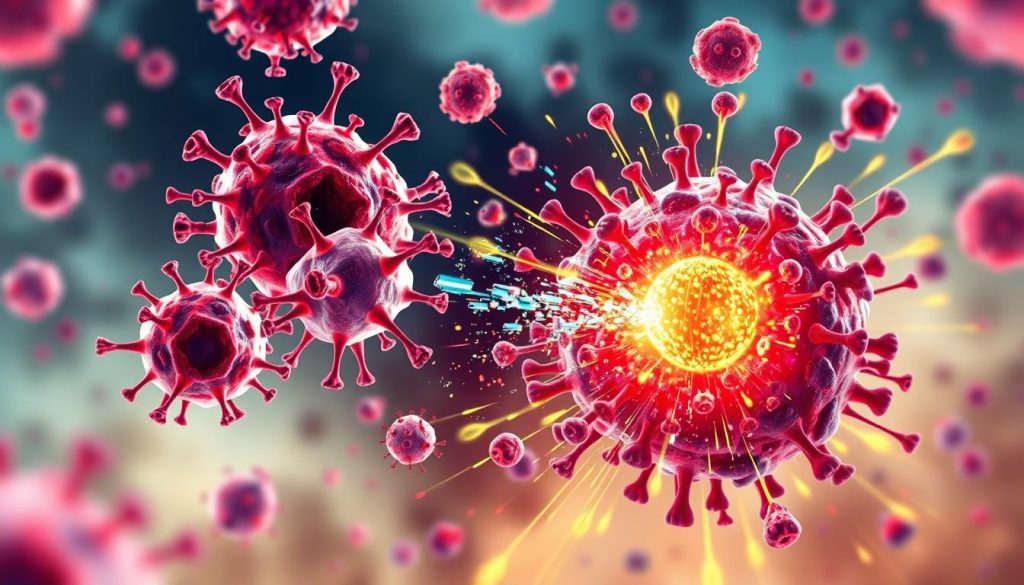
The table below shows how CAR T-cell therapy is better than traditional chemotherapy. It highlights the benefits of this targeted approach.
| Treatment Type | Common Side Effects | Severity of Side Effects |
|---|---|---|
| CAR T-Cell Therapy | Fatigue, Fever, Headache | Mild to Moderate |
| Chemotherapy | Nausea, Hair Loss, Severe Fatigue | Severe |
The data clearly shows CAR T-cell therapy is more precise and gentler. It’s a step towards effective, personalized cancer therapy. This approach treats cancer well while caring for the patient’s overall health.
Personalized Cancer Therapy: A New Era in Treatment
The world of personalized cancer therapy has seen a major leap forward with CAR T-cell therapy. This change is reshaping how we treat cancer, making treatments more precise and effective for each patient.
In CAR T-cell therapy, doctors take a patient’s T cells and make them attack cancer cells. This method is not just a treatment but a personalized way to fight cancer. It’s tailored to each patient’s cancer type and genetic makeup, showing the true spirit of personalized medicine.
This move towards personalized cancer therapy aims to improve treatment results. It focuses on the genetic makeup of a tumor, lowering the chance of resistance and recurrence. For more on how CAR T-cells work, check out this scientific study.
| Features | Benefits of Personalized Therapy |
|---|---|
| Customized Treatment | Reduces potential for side effects and increases treatment efficacy. |
| Targeted Approach | Directly attacks cancer cells while sparing healthy cells. |
| Long-term Remission | Improves chances for long-term disease control and quality of life. |
The medical field is still learning about CAR T-cell therapy in different cancers. But the idea of personalized treatment is key. It shows great promise in treating complex and hard-to-treat cancers. This approach not only improves patient care but also marks a shift towards more tailored treatments.
The Critical Role of Adoptive Cell Transfer in Cancer Treatment
Adoptive cell transfer is key in cancer treatment, making treatments like CAR T-cell therapy more effective. It boosts the immune system’s fight against cancer. This method also leads to more personalized medical treatments.
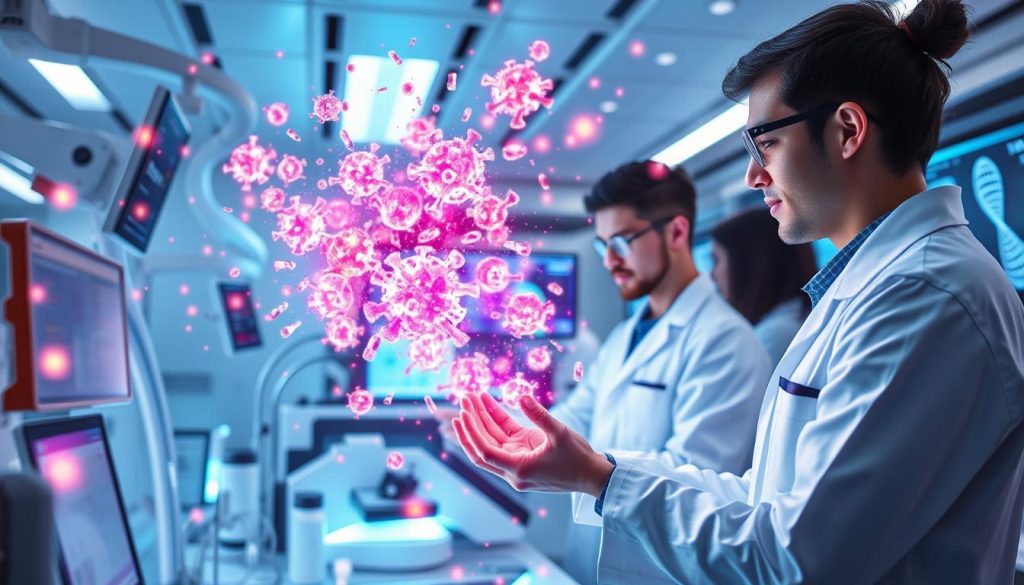
Augmenting the Immune System’s Ability to Fight Cancer
Adoptive cell transfer is a big step in making the immune system stronger against cancer. It takes immune cells, changes them, and makes them fight cancer well. This therapy is a major leap in cancer treatment.
Adoptive Cell Transfer vs. Other Immune Therapies
Adoptive cell transfer stands out because it offers specific and personalized treatments. These treatments aim to greatly improve patient results. This is different from traditional treatments that are more general.
- Targeted therapy: Adoptive cell transfer targets cancer cells directly, protecting healthy cells.
- Reduced side effects: The precise targeting reduces side effects compared to other treatments.
- Improved survival rates: Early trials show CAR T-cell therapy, a form of adoptive cell transfer, leads to better survival rates.
Adoptive cell transfer is making cancer treatment better and more precise. It’s leading to a new era of effective treatments. This brings hope to those fighting cancer.
Success Stories: CAR T-Cell Therapy Clinical Trials
Recently, CAR T-cell therapy clinical trials have shown great promise. They use the patient’s own immune cells, making them stronger against cancer. This has led to long-term remission in many cases.
Remissions Achieved Through CAR T-Cell Therapy
CAR T-cell therapy has shown its power in fighting blood cancers. Trials worldwide have seen high remission rates, especially in acute lymphoblastic leukemia (ALL). This shows how personalized medicine is changing cancer treatment.
Bridging the Gap towards a Cure for Blood Cancers
As trials continue, hope grows for a blood cancer cure. CAR T-cell therapy targets cancer cells without harming healthy ones. This could lead to a future where blood cancer is manageable or curable.
To learn more about CAR T-cell therapy and its impact, click here. You’ll find patient success stories and updates on ongoing trials. These resources are crucial for those considering this treatment.
Understanding the Limitations and Challenges of CAR T-Cell Therapy
CAR T-cell therapy has made huge strides in cancer treatment. Yet, it faces many challenges. These include treatment resistance and complex immune responses. Both are major hurdles in using CAR T-cell therapy more widely.
Addressing Treatment Resistance and Relapse
One big challenge is overcoming treatment resistance. Some patients do well at first but then relapse. This can happen because cancer cells change and patients’ immune systems react differently.
Scientists are working hard to understand why this happens. They aim to make the therapy more effective for longer periods.
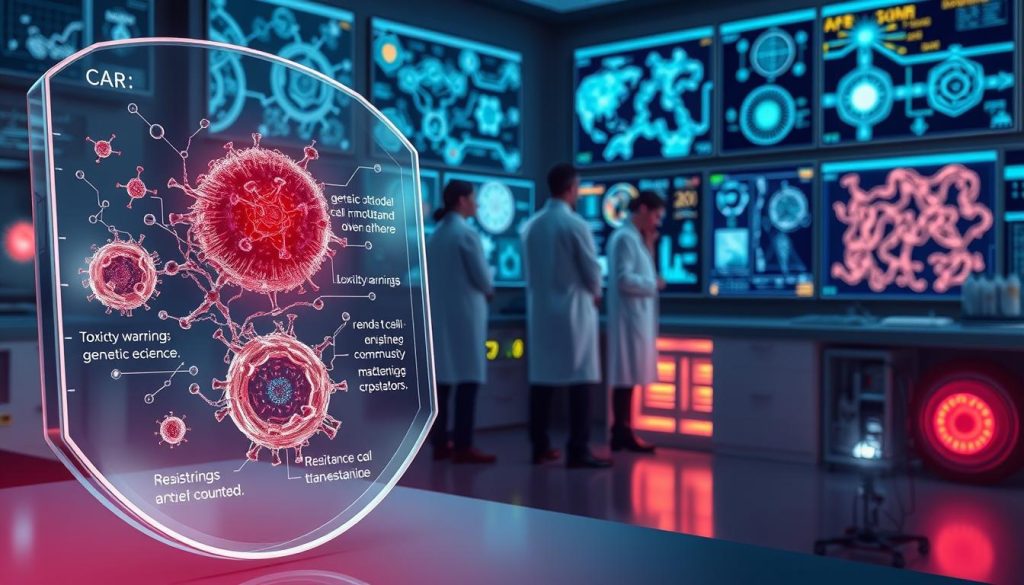
Navigating the Complexities of Immune Responses
It’s crucial to understand and manage immune responses in CAR T-cell therapy. The goal is to strengthen the immune system against cancer. But, it can also cause severe side effects.
Immune system overactivation, or cytokine release syndrome (CRS), is a major concern. It needs careful management to keep patients safe and the therapy effective.
| Challenge | Description | Current Approaches |
|---|---|---|
| Managing Treatment Resistance | Patient’s cancer cells mutate or hide from CAR T-cell recognition | Development of next-generation CAR T cells targeting multiple cancer cell antigens |
| Controlling Immune Responses | Balance between effective treatment and prevention of severe CRS | Use of tocilizumab and steroids in severe cases |
Addressing the Cost of CAR T-Cell Therapy
The cost of CAR T-cell therapy is a big issue in cancer treatment talks. It has the power to change cancer care but is too expensive for many. This has led to efforts to make it more accessible cellular immunotherapy.
Paving the Way Towards Accessible Cellular Immunotherapy
There are many ways to lower the cost of CAR T-cell therapy. New biotech, better manufacturing, and partnerships are being explored. Also, policy makers and insurance companies are working to make it more affordable for everyone.
| Treatment Aspect | Cost Factor | Potential Reduction Strategy |
|---|---|---|
| Cell Engineering | High initial setup and material costs | Automated processes and better technology integration |
| Clinical Administration | Specialized care requirements | Training more healthcare professionals |
| Post-Treatment Monitoring | Long-term patient follow-up | Using digital tools and remote monitoring systems |
These strategies aim to cut the cost of CAR T-cell therapy and make it more accessible cellular immunotherapy. Saving lives is the main reason for making it affordable. It’s crucial for the medical field and society.
Genetically Engineered Immune Cells: The Front Line of Cellular Immunotherapy
The field of cellular immunotherapy has seen big leaps thanks to genetically engineered immune cells. These cells are key in a new way to fight cancer. They use the body’s immune system to target and destroy cancer cells more effectively.
Scientists can now make immune cells better at fighting cancer. They do this by changing the cells to have special receptors. This lets them find and kill cancer cells without harming healthy ones.
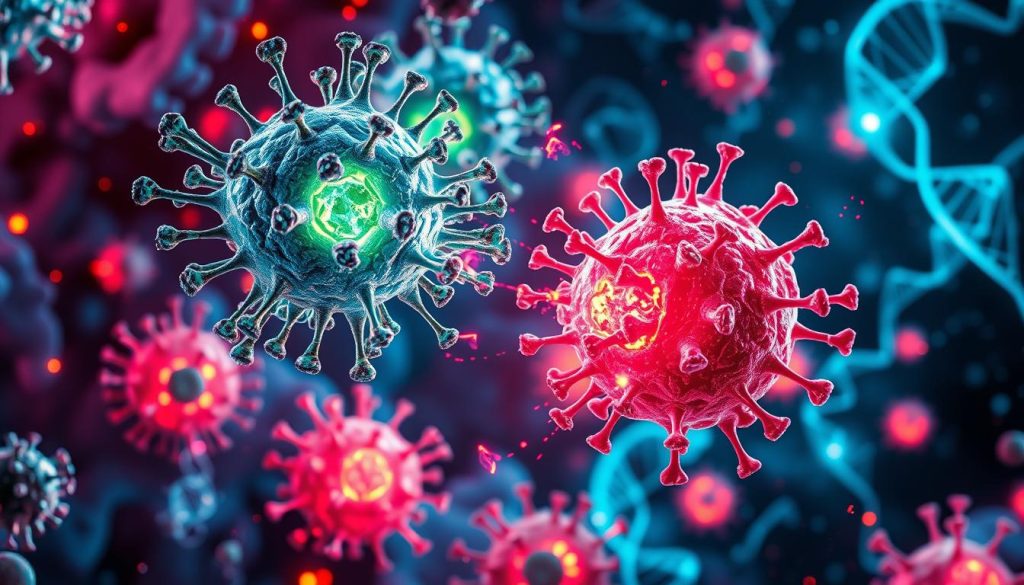
The use of genetically engineered immune cells has shown great results in treating many cancers. It’s not just a treatment; it could change how we manage and possibly cure some cancers.
- Enhanced targeting of cancer cells.
- Reduced side effects compared to conventional treatment methods.
- Potential for long-term remission by equipping the body with ‘memory’ T-cells.
Genetically engineered immune cells are leading the way in cellular immunotherapy. They offer hope for cancer patients and mark a shift towards more personalized healthcare. Ongoing research aims to make these therapies even better, promising a future where cancer might be managed, not a death sentence.
Autologous Cell Therapy: Using the Body’s Own Cells to Fight Cancer
Autologous cell therapy is a new way to fight cancer. It uses a patient’s own cells to attack the disease. This method, especially CAR T-cell therapy, is very effective because it targets cancer cells precisely.
It’s important to know how this therapy works and its benefits. This will help us see how it changes cancer treatment.
Advantages of Using a Patient’s Own Cells for Treatment
Using a patient’s own cells for therapy has many benefits. The biggest one is that there’s little chance of the body rejecting the treatment. This makes it easier for the cells to work well in the body.
CAR T-cell therapy has also shown great results in treating blood cancers. It works when other treatments don’t.
Another big plus is that the effects can last a long time. The modified cells keep fighting cancer, protecting the body from future attacks.
The Complex Logistics Behind Autologous CAR T Therapies
Getting autologous CAR T-cell therapy involves many steps. First, cells are taken from the patient’s blood. Then, they are changed in a lab to fight cancer better.
The hard part is getting these cells back to the patient safely and quickly. This requires special places and tools.
It also needs teamwork from different healthcare and tech groups. They make sure the cells work well when they’re put back in the patient.
Learning about autologous cell therapy and CAR T-cell therapy helps us move forward. It makes treatments more personal and opens new ways to fight cancer with advanced science.
CAR T-Cell Therapy: A Look at the Current Landscape and Future Possibilities
CAR T cell therapy is changing the game in cancer treatment. It uses a patient’s T cells to fight cancer. This method has already helped many with blood cancers.
It’s now approved for some types of leukemia and lymphoma. This marks a new chapter in targeted cancer treatment. But, there are talks about its cost and how much it needs.
Today, CAR T cell therapy is used in real-world treatments. It gives hope to those who’ve tried everything else. But, it’s still being studied for solid tumors.
Researchers are working hard to make it better and safer. They want to use it for more types of cancer. This could make it cheaper and more available.
Looking ahead, CAR T cell therapy is expected to play a big role in cancer care. Scientists are excited about its future. They believe it will help more people and become more affordable.
FAQ
Q: What is CAR T-cell therapy?
A: CAR T-cell therapy is a new way to fight cancer. It uses special immune cells to find and kill cancer cells. This method is a big step forward in cancer treatment.
Q: How does CAR T-cell therapy work?
A: First, T-cells from your blood are taken to a lab. There, they are changed to recognize cancer cells. Then, these T-cells are put back into your body to fight cancer.
Q: What are the benefits of CAR T-cell therapy compared to traditional treatments?
A: CAR T-cell therapy is better than old treatments like chemo and radiation. It targets cancer cells directly, which can lead to fewer side effects. It’s also made just for you, which might make it work better.
Q: Can CAR T-cell therapy be used for all types of cancers?
A: Right now, it works best for blood cancers like leukemia and lymphoma. But scientists are working hard to use it for other cancers too.
Q: What is adoptive cell transfer in the context of CAR T-cell therapy?
A: Adoptive cell transfer is a way to treat cancer by using your own immune cells. CAR T-cell therapy is a special kind of this. It changes T-cells to attack cancer cells.
Q: Are there any challenges with CAR T-cell therapy?
A: Yes, there are challenges. It can cause severe reactions, is hard to make, and some cancer cells can avoid it. Also, some patients might have cancer come back after treatment.
Q: How is CAR T-cell therapy personalized to each patient?
A: It’s made just for you based on your cancer. T-cells are taken from your blood and changed to fit your cancer. This makes each treatment unique.
Q: What is the role of genetically engineered immune cells in cellular immunotherapy?
A: Genetically engineered immune cells are key in fighting cancer. They are changed to better find and kill cancer cells. This makes treatments like CAR T-cell therapy more effective.
Q: What does autologous cell therapy mean in CAR T-cell therapy?
A: Autologous cell therapy means using your own cells for treatment. In CAR T-cell therapy, it means using your T-cells to fight cancer. This reduces the chance of your body rejecting the treatment.
Q: Is CAR T-cell therapy widely available?
A: It’s available in some advanced medical centers. It’s approved for certain blood cancers. As research grows, it will likely be available for more cancers.
Q: What is the future outlook for CAR T-cell therapy?
A: The future looks bright for CAR T-cell therapy. Scientists are working to make it better, safer, and available for more cancers. It’s a big part of the fight against cancer.
Q: How is the cost of CAR T-cell therapy being addressed?
A: The high cost is a big worry. But, there are efforts to make it more affordable. This includes new payment plans, insurance help, and ways to lower production costs.












